Lasting Effects of Male Sexual Abuse
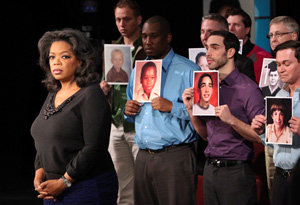
Photo: George Burns/Harpo Studios
On November 5, 2010, Oprah, Tyler Perry and 200 male audience members made television history when they stood together to say they were sexually abused as children. Now, the significant others and family members of these courageous men are joining the conversation.
"When abuse destroys the man, it destroys everything in their lives, including their relationships," Oprah says. "Sexual abuse—I know this for sure—plants the seeds of inferiority and worthlessness, and then that inferiority and worthlessness shapes the way you start to think about yourself and the way you act and act out. That's why we're here today: to release some of that."
"When abuse destroys the man, it destroys everything in their lives, including their relationships," Oprah says. "Sexual abuse—I know this for sure—plants the seeds of inferiority and worthlessness, and then that inferiority and worthlessness shapes the way you start to think about yourself and the way you act and act out. That's why we're here today: to release some of that."
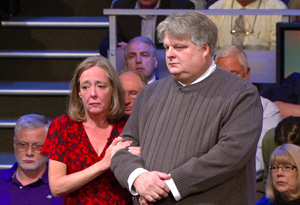
In an informal poll taken before the show, 80 percent of the male sexual abuse survivors in the Oprah Show audience said they struggle with intimacy.
"It's really important to know that it's absolutely possible to heal and recover completely and fully," says Dr. Howard Fradkin, a psychologist who has dedicated his career to helping male survivors. "It takes a lot of time. It impacts everybody in your life because you don't want to talk. You don't want to share. You don't want to trust that anyone will honor the very things that you've had to keep inside for so long."
John, a sexual abuse survivor, and his wife, Susan, say they haven't been intimate for eight years. Even before they stopped having sex, Susan says John was distant, and despite her best efforts, she couldn't get him to open up. Eventually, Susan started asking herself, "What's wrong with me?"
"I got shut out and shut down," she says. "He withdrew."
Then, a year and a half ago, John told his wife he had been molested when he was a child. But after the words were out of John's mouth, Susan says he began to isolate himself once again. "He said: 'This is what happened and no questions. I'm not telling you anything, and don't ask me anything,'" Susan says. "I've tried. It's like he resents me and hates me."
Tyler tells Susan that John's reaction has nothing to do with her, but despite reassurance, Susan is at a loss. "I don't know how to help him," she says. "I want to help him recover, and he won't go to counseling."
"But this is a beginning," Oprah says. "The fact that John is here..."
"Yes, it is," Susan says. "And I'm so proud of him."
"It's really important to know that it's absolutely possible to heal and recover completely and fully," says Dr. Howard Fradkin, a psychologist who has dedicated his career to helping male survivors. "It takes a lot of time. It impacts everybody in your life because you don't want to talk. You don't want to share. You don't want to trust that anyone will honor the very things that you've had to keep inside for so long."
John, a sexual abuse survivor, and his wife, Susan, say they haven't been intimate for eight years. Even before they stopped having sex, Susan says John was distant, and despite her best efforts, she couldn't get him to open up. Eventually, Susan started asking herself, "What's wrong with me?"
"I got shut out and shut down," she says. "He withdrew."
Then, a year and a half ago, John told his wife he had been molested when he was a child. But after the words were out of John's mouth, Susan says he began to isolate himself once again. "He said: 'This is what happened and no questions. I'm not telling you anything, and don't ask me anything,'" Susan says. "I've tried. It's like he resents me and hates me."
Tyler tells Susan that John's reaction has nothing to do with her, but despite reassurance, Susan is at a loss. "I don't know how to help him," she says. "I want to help him recover, and he won't go to counseling."
"But this is a beginning," Oprah says. "The fact that John is here..."
"Yes, it is," Susan says. "And I'm so proud of him."
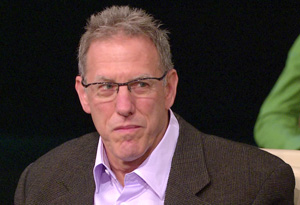
Photo: George Burns/Harpo Studios
Dr. Howard Fradkin says John and Susan's relationship issues are very common in the survivor community. "When [men are] abused, they learn that they're supposed to keep it all inside," he says.
When a survivor keeps his pain buried deep down inside, these feelings may manifest into other issues. Some survivors begin to feel depressed, suicidal or numb. Others may act out and have promiscuous sex, drink alcohol or gamble, Dr. Fradkin says.
One lesson Dr. Fradkin teaches the survivors he works with is recovery is about "being disloyal to dysfunction and loyal to functionality." "You have to identify what those dysfunctional messages are, like 'I'm worthless,' 'I don't deserve to be loved and cared about,'" he says. "You have to challenge every one of those."
Often, it's difficult to know what these dysfunctional messages are. "We get all twisted up by our perpetrators and by our culture, by what we learn as men," Dr. Fradkin says. "We have to relearn all that and learn functional messages, functional behaviors, which lead to then having functional relationships. It's possible."
When a survivor keeps his pain buried deep down inside, these feelings may manifest into other issues. Some survivors begin to feel depressed, suicidal or numb. Others may act out and have promiscuous sex, drink alcohol or gamble, Dr. Fradkin says.
One lesson Dr. Fradkin teaches the survivors he works with is recovery is about "being disloyal to dysfunction and loyal to functionality." "You have to identify what those dysfunctional messages are, like 'I'm worthless,' 'I don't deserve to be loved and cared about,'" he says. "You have to challenge every one of those."
Often, it's difficult to know what these dysfunctional messages are. "We get all twisted up by our perpetrators and by our culture, by what we learn as men," Dr. Fradkin says. "We have to relearn all that and learn functional messages, functional behaviors, which lead to then having functional relationships. It's possible."

Photo: George Burns/Harpo Studios
According to our informal poll, 81 percent of the men in the audience say they have contemplated suicide. Thirty-three percent of these men actually attempted to take their own lives, including Tyler. When he was just 11 years old, Tyler says he slit his own wrists. "It was all too much having to carry the shame of it, not being able to talk about it," he says.
Dr. Fradkin says this is a horrifying statistic. "That speaks volumes to the pain that's out there," he tells the survivors. "I'm thankful that all of you survived, that all of you had the courage."
Many male survivors struggle with depression, Dr. Fradkin says, because abuse is a betrayal that's devastatingly shameful. "Their manhood was taken. Their spirituality was taken. Their ability to connect in a safe way was taken," he says. "They feel no safety in the world, and suicide seems like a safe alternative. Of course, it's not. But in their minds, that sometimes is the only option because there's no one to turn to. There's no one to tell."
Dr. Fradkin says this is a horrifying statistic. "That speaks volumes to the pain that's out there," he tells the survivors. "I'm thankful that all of you survived, that all of you had the courage."
Many male survivors struggle with depression, Dr. Fradkin says, because abuse is a betrayal that's devastatingly shameful. "Their manhood was taken. Their spirituality was taken. Their ability to connect in a safe way was taken," he says. "They feel no safety in the world, and suicide seems like a safe alternative. Of course, it's not. But in their minds, that sometimes is the only option because there's no one to turn to. There's no one to tell."

Photo: George Burns/Harpo Studios
Some male survivors in Oprah's audience also struggle with sexual confusion. When boys are abused by men, Dr. Fradkin says they may experience sexual pleasure and enjoy the attention, but that doesn't mean these boys are homosexual. "Sexual orientation is determined early on in life, probably by age 4 or 5, and most abuse happens after that," he says. "It's not that the sexual abuse causes sexual orientation. It's that people get confused about it because they don't know what to feel about that connection they felt."
Dr. Fradkin says this confusion can occur when a boy is abused by a woman, as well. "If it's a gay man or a guy who's going to become gay who's abused by a man, then his confusion or his fear is that: 'Oh my gosh, I've been found out. I already know I'm different. They picked me out, and they want me. Now the whole world knows about me,'" Dr. Fradkin says. "If it's a boy who's abused by a woman, and he's going to become heterosexual, then we talked about all the shame that happens—all the inadequacy. All the: 'I didn't control it. I wasn't in charge.' There's horrendous shame about a woman abusing a man."
Dr. Fradkin's words strike a chord with Tyler. "Experiencing everything that you're talking about is really...wow, that's awesome to finally understand it," Tyler says. "Walking through it, trying to figure it out myself in my teens and 20s, trying to figure out, 'What is this?' and realizing that this person gave me something that did not belong to me."
Dr. Fradkin says this confusion can occur when a boy is abused by a woman, as well. "If it's a gay man or a guy who's going to become gay who's abused by a man, then his confusion or his fear is that: 'Oh my gosh, I've been found out. I already know I'm different. They picked me out, and they want me. Now the whole world knows about me,'" Dr. Fradkin says. "If it's a boy who's abused by a woman, and he's going to become heterosexual, then we talked about all the shame that happens—all the inadequacy. All the: 'I didn't control it. I wasn't in charge.' There's horrendous shame about a woman abusing a man."
Dr. Fradkin's words strike a chord with Tyler. "Experiencing everything that you're talking about is really...wow, that's awesome to finally understand it," Tyler says. "Walking through it, trying to figure it out myself in my teens and 20s, trying to figure out, 'What is this?' and realizing that this person gave me something that did not belong to me."
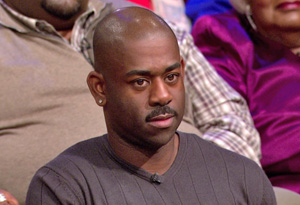
For the past 15 years, Ray has worked for The Oprah Show and helped produce many shows about childhood sexual abuse. But the night before this show was scheduled to tape, Ray sat in Oprah's office and revealed that he, too, is a survivor.
Ray says he decided to share his story after speaking to some of the men in the audience. "I couldn't ask them to do it, and I not do it," he says. "I knew that as long as I wasn't speaking out about it, if I wasn't putting my face on it, then it still had control over me."
Tired of living with the effects of abuse, Ray is taking a stand. "I'm just not willing to live my life like that," he says. "I didn't do this to me, so why am I walking around with all of the aftermath? Why am I walking around with the guilt and the shame and all the things that go along with it?"
When Ray first shared his story with Oprah, he explained there is a difference between trying to cope and being ready to heal. "I thought that was really profound and poignant that there is a really big difference between coping ... the fact that you're still standing means you've coped with it," Oprah says. "Now you're ready to open the doors to healing. You see the difference."
Ray says healing begins when you start to let yourself feel, you're honest with yourself about what the abuse has done to you and you're able to mourn. "I've been a big bucket of tears through this whole process," he says. "I would be driving to work, [I would] pull over to the side of the road and just break down. It wasn't until I read an email from Howard that said, 'You have to mourn it,' that got me to understand that that's what I'm going through."
Ray says he decided to share his story after speaking to some of the men in the audience. "I couldn't ask them to do it, and I not do it," he says. "I knew that as long as I wasn't speaking out about it, if I wasn't putting my face on it, then it still had control over me."
Tired of living with the effects of abuse, Ray is taking a stand. "I'm just not willing to live my life like that," he says. "I didn't do this to me, so why am I walking around with all of the aftermath? Why am I walking around with the guilt and the shame and all the things that go along with it?"
When Ray first shared his story with Oprah, he explained there is a difference between trying to cope and being ready to heal. "I thought that was really profound and poignant that there is a really big difference between coping ... the fact that you're still standing means you've coped with it," Oprah says. "Now you're ready to open the doors to healing. You see the difference."
Ray says healing begins when you start to let yourself feel, you're honest with yourself about what the abuse has done to you and you're able to mourn. "I've been a big bucket of tears through this whole process," he says. "I would be driving to work, [I would] pull over to the side of the road and just break down. It wasn't until I read an email from Howard that said, 'You have to mourn it,' that got me to understand that that's what I'm going through."
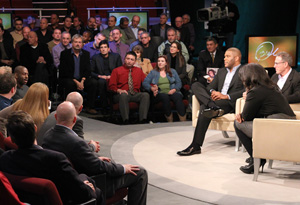
Photo: George Burns/Harpo Studios
Childhood sexual abuse can have a profound effect on a person's confidence and self-esteem, especially if he's trying to conceal the pain. "The work it takes to hide it weakens everything else," Ray says. "I knew that I had the confidence to do what I wanted to in the world. I was raised that way. But with this in the background in my life, I just overdid everything ... to prove that I was worthy."
"Bottom line: It's a worthiness issue, is it not?" Oprah asks Dr. Fradkin.
"It's that healing of all that deep shame that we blamed ourselves for and held ourselves accountable for when it wasn't our fault," Dr. Fradkin says. "It's essential to heal that shame and to be able to know that it was truly some other person's actions against you that caused all this pain. You have a right to heal."
"Bottom line: It's a worthiness issue, is it not?" Oprah asks Dr. Fradkin.
"It's that healing of all that deep shame that we blamed ourselves for and held ourselves accountable for when it wasn't our fault," Dr. Fradkin says. "It's essential to heal that shame and to be able to know that it was truly some other person's actions against you that caused all this pain. You have a right to heal."
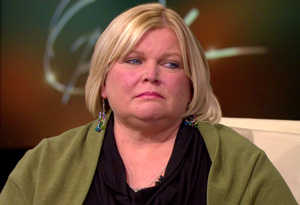
Photo: George Burns/Harpo Studios
Some male sexual abuse survivors struggle with self-perception, while others are afraid of how society will perceive them. One major misconception is the belief that men who were abused will grow up to become abusers. An audience member explains that this is why many men don't report their abuse. "They don't want people to think they're going to be one of them," he says. "One of the bad guys."
Dr. Fradkin agrees. "We do know that many molesters have been perpetrated themselves, but men who are perpetrated, very few of them go [on to become abusers]," Dr. Fradkin says. "Most men who are abused, and I'm sure I speak for all of you, abhor that kind of violence and would never do that to another person."
Many male survivors, however, are terrified to be around children. "A lot of times, men get triggers—like they're changing diapers—because of something that was done to them, and so they get triggered and they feel afraid," Dr. Fradkin says. "Even though they know inside their heads, 'There's nothing I would ever do to this child.'"
Dr. Fradkin agrees. "We do know that many molesters have been perpetrated themselves, but men who are perpetrated, very few of them go [on to become abusers]," Dr. Fradkin says. "Most men who are abused, and I'm sure I speak for all of you, abhor that kind of violence and would never do that to another person."
Many male survivors, however, are terrified to be around children. "A lot of times, men get triggers—like they're changing diapers—because of something that was done to them, and so they get triggered and they feel afraid," Dr. Fradkin says. "Even though they know inside their heads, 'There's nothing I would ever do to this child.'"
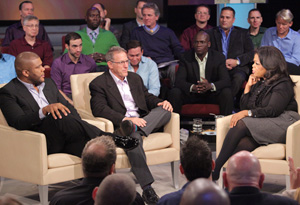
In order to move forward, Dr. Fradkin says a sexual abuse survivor must first learn to speak his truth. The second step is to find a support group, whether in person or through a virtual chat room. "Finding other survivors who have had the same experience you have is very important," Dr. Fradkin says. "When we speak the truth to somebody else, that's when the shame begins to heal."
But, for some, speaking the truth isn't enough. "It's really important to get more help so that you have some tools," Dr. Fradkin says. "There are lots of tools that therapists can offer you. ... It's important to learn skills about how to manage those terrible, awful flashbacks that survivors have."
Meditation and hypnosis are just some of the therapies available to survivors. "The idea is to go back there and rescue that boy and bring him to a safe place so that the man and the boy get to have one life together," Dr. Fradkin says. "And that's possible."
More from the show
Get Dr. Fradkin's advice on how to support your male survivor
Supporters of male sexual abuse survivors speak out
Watch survivors talk about the effects of their abuse
But, for some, speaking the truth isn't enough. "It's really important to get more help so that you have some tools," Dr. Fradkin says. "There are lots of tools that therapists can offer you. ... It's important to learn skills about how to manage those terrible, awful flashbacks that survivors have."
Meditation and hypnosis are just some of the therapies available to survivors. "The idea is to go back there and rescue that boy and bring him to a safe place so that the man and the boy get to have one life together," Dr. Fradkin says. "And that's possible."
More from the show
Get Dr. Fradkin's advice on how to support your male survivor
Supporters of male sexual abuse survivors speak out
Watch survivors talk about the effects of their abuse



